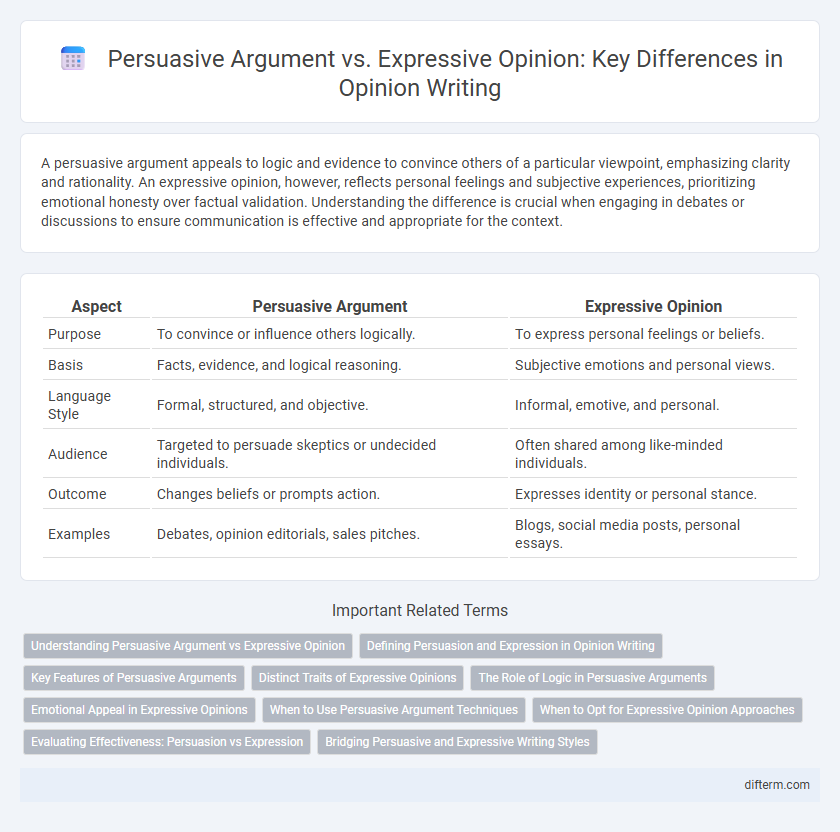A persuasive argument appeals to logic and evidence to convince others of a particular viewpoint, emphasizing clarity and rationality. An expressive opinion, however, reflects personal feelings and subjective experiences, prioritizing emotional honesty over factual validation. Understanding the difference is crucial when engaging in debates or discussions to ensure communication is effective and appropriate for the context.
Table of Comparison
| Aspect | Persuasive Argument | Expressive Opinion |
|---|---|---|
| Purpose | To convince or influence others logically. | To express personal feelings or beliefs. |
| Basis | Facts, evidence, and logical reasoning. | Subjective emotions and personal views. |
| Language Style | Formal, structured, and objective. | Informal, emotive, and personal. |
| Audience | Targeted to persuade skeptics or undecided individuals. | Often shared among like-minded individuals. |
| Outcome | Changes beliefs or prompts action. | Expresses identity or personal stance. |
| Examples | Debates, opinion editorials, sales pitches. | Blogs, social media posts, personal essays. |
Understanding Persuasive Argument vs Expressive Opinion
Understanding persuasive argument involves recognizing its goal to influence others through logical reasoning and evidence, aiming for a change in beliefs or actions. Expressive opinion prioritizes conveying personal feelings or attitudes without necessarily seeking to convince others. Differentiating these modes clarifies communication intent, enhancing both critical thinking and emotional expression skills.
Defining Persuasion and Expression in Opinion Writing
Persuasive argument in opinion writing seeks to convince the reader through logical reasoning, evidence, and appeals to emotion or ethics, aiming to change or reinforce beliefs and actions. Expressive opinion prioritizes the writer's personal feelings, attitudes, and subjective viewpoints without necessarily requiring evidence or formal argument structure. Defining persuasion involves its function as a deliberate effort to influence viewpoints, whereas expression emphasizes authentic self-representation and emotional resonance in the communication of opinions.
Key Features of Persuasive Arguments
Persuasive arguments rely on logical evidence, clear reasoning, and credible sources to influence the audience's beliefs or actions. They prioritize structured claims supported by facts and aim to convince through rational appeal rather than emotional expression. The key features include a clear thesis, coherent organization, and anticipation of counterarguments to strengthen the overall position.
Distinct Traits of Expressive Opinions
Expressive opinions primarily reveal personal feelings, values, or identity rather than aiming to convince others with logical evidence or data. They often use subjective language and emotional tones, emphasizing individual perspectives over universal claims. Unlike persuasive arguments, expressive opinions prioritize authentic self-expression and emotional resonance instead of structured reasoning or factual support.
The Role of Logic in Persuasive Arguments
Persuasive arguments rely heavily on the role of logic to structure claims and evidence in a coherent, rational manner that convinces an audience through reason. Unlike expressive opinions, which primarily convey personal feelings or beliefs, persuasive arguments use logical frameworks such as deductive or inductive reasoning to validate conclusions objectively. Logical coherence enhances credibility and effectiveness in influencing others by minimizing emotional bias and emphasizing factual accuracy.
Emotional Appeal in Expressive Opinions
Expressive opinions harness emotional appeal to connect deeply with the audience's values and feelings, creating a powerful subjective impact. Unlike persuasive arguments that rely on logic and evidence, expressive opinions emphasize personal experience and passion to influence beliefs. This emotional resonance enhances engagement, making the opinion memorable and influential on an individual level.
When to Use Persuasive Argument Techniques
Persuasive argument techniques are most effective when aiming to influence decisions or prompt action by presenting logical evidence and credible reasoning. Use these methods in professional settings, debates, or marketing campaigns where convincing an audience is essential. Employing persuasive strategies strengthens credibility and drives desired outcomes more effectively than merely expressing personal opinions.
When to Opt for Expressive Opinion Approaches
Expressive opinion approaches are best suited for situations where personal values and emotional resonance are more impactful than factual persuasion, such as in artistic discussions or social identity debates. These approaches emphasize authenticity and personal voice, fostering connection and empathy rather than aiming to change the audience's beliefs. Opting for expressive opinions strengthens community bonds and validates individual experience when objective evidence is less central to the discourse.
Evaluating Effectiveness: Persuasion vs Expression
Evaluating the effectiveness of persuasive arguments involves measuring how well the message influences beliefs, attitudes, or behaviors, often requiring logical evidence and emotional appeal tailored to the audience. Expressive opinions prioritize authenticity and emotional resonance, emphasizing personal perspective over factual persuasion. The success of persuasion lies in its ability to change minds, whereas expression thrives on conveying genuine feelings without necessarily seeking consensus.
Bridging Persuasive and Expressive Writing Styles
Bridging persuasive and expressive writing styles enhances communication by combining logical reasoning with emotional resonance, creating arguments that engage both the mind and heart. Integrating factual evidence with personal voice strengthens credibility while fostering authenticity, which persuades audiences through trust and relatability. Effective writing blends structured argumentation from persuasive techniques with the nuanced, subjective insights of expressive opinions, resulting in impactful and memorable messages.
Persuasive argument vs Expressive opinion Infographic

 difterm.com
difterm.com